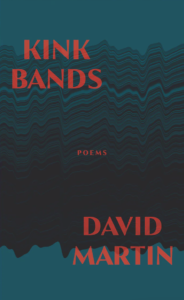By Steven Ross Smith
Kink Bands
by David Martin
NeWest Press (2023)
We’re in the mountains here, or in a classroom, or touring earth … but where doesn’t exactly matter because we’re also inhabiting the terrain of David Martin’s wild musical mind, his surreal habitation, his scientific research, poetry’s temporal orbit—all that charged with chiselled form and lexicon— startling and often disorienting. As he writes: …I purr, musing on a headrush / of leaping from this pose to free fall. Yet he plummets with skill, as in “Mouth Scarp”, his Morphemes moshed / to his labial bluff, / katabatic ricochet. His tumble does take us to named places, often in Alberta, and sometimes with his nuclear family—to Lake Minnewanka, Bankhead, the Frank Slide, and Athabasca glacier, but just as often he and we inhabit books and theories such as “Seven Clues to the Origins of Life” (A.G.Smith-Cairns) and the Quaternary sedimentology of Robin Woywitka, seeking insight and vocabulary.
And those kink bands of the title? Knowing that Martin is a musician, a peruser might assume that the book is about music; or maybe about certain sexual proclivities. It turns out that geologically speaking, kink bands are a type of double hinged folds that result from the shearing of rocks. In Martin’s book the bands’ strata and phenomena are geologic and geographic, occasionally personal, and often striped with a shrewdly grinning wit. The book itself folds in layers, pressurized and metamorphic, described perhaps best by his own words: “plump as a brittle-bladed midden.”
Terminologies, methods, and references will send a dedicated reader scurrying to the end notes or to Google or Wikipedia for meanings, definitions, and sources…and so engagement and curiosity are essential modes, and when stirred will reward.
Disclosure: I was surprised to see my name mentioned in Martin’s “Acknowledgements,” yet I don’t recall commenting previously on any versions of these poems or the manuscript, but I must have. I have met David and read his earlier work. So, though I approach his writing with apparent familiarity, I’m reading and commenting as objectively as possible within my own frame; my lens is a bias for innovative poetry that upturns well-trod soil. And I offer not so much a critical take, but rather observation.
So, onward. A reader feels that Martin has left no stone unturned, or perhaps, no turn unstoned, for there is an earthy and at the same time an hallucinatory experience here. The language dazzles and disorients, as in two separate gatherings of “Unsorted Till”—If your fettle is frowsted, my / of thrust faults leaping old over new. / my baton // embers; or, touching on music notes, … they’ll mail a mile of microscopic trombone. In “Giddy in the Abyss” he rhymes uniformitarian with abecedarian, and Napoleon with Devonian.
As geology is about time, the clock may slip back, as in “On Marbel,” Martin’s derivation from Pliny and nod to Chaucer: For Nature crafted stoon to halt / wilde desyres with-inne, / knowinge that oure strong defaute / do tempten us to sinne.
Like the earth’s layers, there is no single form dominating the book. Martin shapes his poems as tight spaceless rectangles, symmetrical centre-oriented whorls, couplets, staggered lines, and more. And his deft strokes include sampling, hybridizing, disjunction, sometimes with nods to l=a=n=g=u=a=g=e or lyric poetry or old English. A reader travels with him, following his route through surprising vocabularies and inventive juxtapositions. It’s a trip, quirky if not kinked.
Steven Ross Smith, Banff Poet Laureate, 2019-21, loves music, practices yoga, and is fascinated by moss. His work often juxtaposes disparate threads, as in his poetic seven-book series fluttertongue. He’s been effective too as a literary activist, on behalf of writers—speaking, teaching, organizing, collaborating, editing, and presenting. He recently published two chapbooks with Jackpine Press. His fourteenth book is Glimmer: Short Fictions (Radiant Press, 2022). Forthcoming is The Green Rose, a collaboration with Phil Hall, from above/ground press. Smith lives and writes in Victoria, BC.

